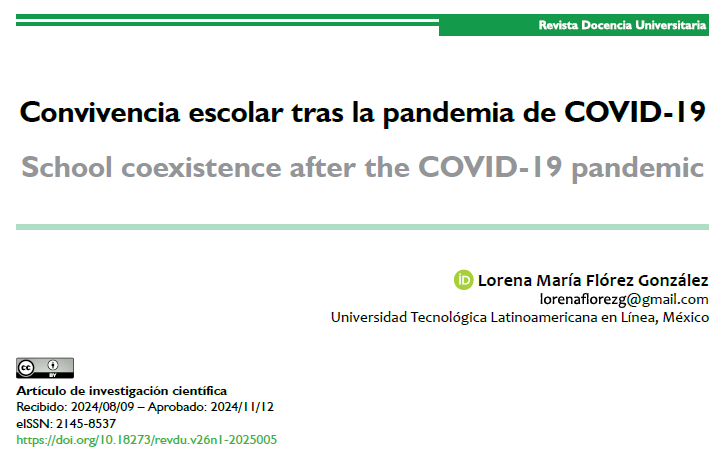
Published 2025-07-01
Keywords
- School coexistence,
- COVID-19 pandemic,
- Student interaction,
- Adaptation,
- High school
How to Cite
Copyright (c) 2025 Revista Docencia Universitaria

This work is licensed under a Creative Commons Attribution 4.0 International License.
Abstract
This qualitative study analyzes school coexistence after the COVID-19 pandemic among students from 6 to 11 grade at a private institution in Bucaramanga, Colombia. The research instrument used was data documentation managed by the school’s counseling department, which collects events related to coexistence, including situations involving students and the pedagogical actions implemented as a result during 2023. The analysis covers the students' interactions with themselves, the educational system, and their peers. The research highlights that the lack of face-to-face contact, combined with the emotional challenges arising from isolation, disrupted the way students relate to each other, manage their emotions, and adhere to school rules. Furthermore, recurring behavioral patterns were identified among students, which affected both the harmony within the school environment and the coexistence between students. The findings reflect the need to implement pedagogical strategies that promote conflict resolution, mutual respect, and adaptation to current school dynamics. This study contributes to understand educational challenges post-pandemic and provides insights to strengthen coexistence in similar contexts.
Downloads
References
- Avilés Martínez, J. M. (2021). Pandemia y convivencia escolar: incertidumbres y retos. Revista Tópicos Educacionais, Universidad Federal de Pernambuco https://doi.org/10.51359/2448-0215.2021.250402
- Aznar Díaz, I., Cáceres Reche, M. P., & Hinojo Lucena, F. J. (2008). Formación integral: educar para la convivencia y la paz. Revista Iberoamericana de Educación, 46(5), 1-12. https://doi. org/10.35362/rie4651957
- Banz, C. (2008). Convivencia escolar. Ministerio de Educación de Chile. https://centroderecursos. educarchile.cl/server/api/core/bitstreams/516e5122-cf1d-49a3-bec1-4021861d06b9/ content
- Bernal Torres, C. A. (2010). Metodología de la investigación: Administración, economía, humanidades y ciencias sociales (3ª ed.). Pearson Educación. Recuperado de https://abacoenred.org/wp-content/uploads/2019/02/El-proyecto-de-investigaci%C3%B3n-F.G.-Arias-2012-pdf.pdf
- Chaparro Caso-López, A. A., Caso Niebla, J., Fierro Evans, M. C., & Díaz López, C. (2015). Desarrollo de un instrumento de evaluación basado en indicadores de convivencia escolar democrática, inclusiva y pacífica. Perfiles Educativos, 37(149). https://doi.org/10.22201/ iisue.24486167e.2015.149.53118
- Dirección General de Educación Superior (Argentina) (2020). La convivencia en tiempos de emergencia: El desafío de sostener lazos entre los actores escolares. Recuperado de https:// dges-cba.infd.edu.ar/sitio/wp-content/uploads/2020/03/La_convivencia_en_tiempos_de_ emergencia_27-03-2020.pdf
- Gómez Gloria, J. y Chaparro, A (2021). La convivencia en el contexto de pandemia: experiencia de docentes de secundaria. Sinéctica, Revista Electrónica de Educación, (57). e1276. https://doi.org/10.31391/S2007-7033(2021)0057-016
- Institución educativa privada (2023). Manual de convivencia. Bucaramanga, Colombia.
- Prieto, B. J. (2017). El uso de los métodos deductivo e inductivo para aumentar la eficiencia del procesamiento de adquisición de evidencias digitales. Cuadernos De Contabilidad, 18(46), 56-65. https://doi.org/10.11144/Javeriana.cc18-46.umdi
- Real Academia Española (2024). Convivir. En Diccionario de la lengua española (23.ª ed.). Recuperado de https://dle.rae.es/convivir
- Sandoval Casilimas, C. A. (2002). Investigación cualitativa. Instituto Colombiano para el Fomento de la Educación Superior (ICFES). Recuperado de https://panel.inkuba.com/sites/2/archivos/ manual%20colombia%20cualitativo.pdf
- UNESCO (2008). Convivencia democrática, inclusión y cultura de paz: lecciones desde la práctica educativa innovadora en América Latina. Oficina Regional de Educación de la UNESCO para América Latina y el Caribe. Recuperado de https://unesdoc.unesco.org/ark:/48223/ pf0000162184
- UNESCO (2020). La educación en tiempos de la pandemia de COVID-19. UNESCO. Recuperado de https://unesdoc.unesco.org/ark:/48223/pf0000374075
- Valencia Murcia, F., & Mazuera, V. (2006). La figura del manual de convivencia en la vida escolar. Elementos para su comprensión. Revista Científica Guillermo de Ockham, 4(1), 119-131. https://revistas.usb.edu.co/index.php/GuillermoOckham/article/view/490
